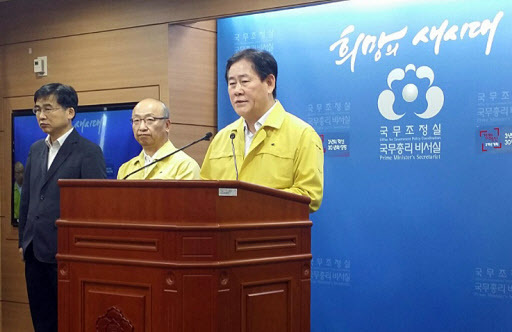South Korea identified all 24 hospitals affected by the deadly Middle East Respiratory Syndrome on Sunday, saying it wanted to ensure the public's safety with transparent information.
Acting Prime Minister Choi Kyung-hwan disclosed the names of the hospitals at a press conference. The government had earlier identified Pyeongtaek St. Mary's Hospital, in Pyeongtaek, Gyeonggi Province, where the first MERS case was confirmed, and Samsung Medical Center in Seoul, one of whose doctors has been diagnosed with MERS and apparently contacted over 1,500 people.

The full list included five more hospitals in Pyeongtaek and six more in the nation's capital.
The government had earlier misidentified one of the Seoul clinics as being located in Gunpo, Gyeonggi Province.
"We're disclosing the hospitals where patients have been diagnosed with MERS, so that we can ensure the people's safety," Choi said. "MERS has been spreading across these hospitals, and it forces us to impose strict control on them. Hospitals with confirmed MERS cases in the future will be identified as well."
The government had been under fire for its refusal to share the names of affected hospitals. It'd reasoned that it didn't want to generate unnecessary fear, though critics said the government had been doing just that by withholding the information.
Of the 24 hospitals, six have had confirmed cases of MERS, while 18 others had MERS patients pass through them.
The six hospitals with the confirmed cases are Pyeongtaek St. Mary's Hospital in Pyeongtaek, Gyeonggi Province; Samsung Medical Center in Seoul; 365 Open Clinic in Seoul; Asan Seoul Clinic in Asan, South Chungcheong Province; Dae Cheong Hospital in Daejeon; and Konyang University Hospital in Daejeon.
Choi said the government will be "as open as possible" in releasing MERS-related information.
"The Health Ministry will be the single source of all relevant information," the acting prime minister added. "Cooperation between regional governments and education offices will be strengthened. We will also encourage the participation of civilian experts in announcing medical information."
Choi also said the government will step up its "all-out efforts" to help fight MERS, involving the regional authorities, the civilian sector and the military.
The official unveiled the government's plans to strengthen its monitoring of patients quarantined in their homes. They will each be matched up with a public servant from their respective regional government. Following discussions with relevant bodies, the government may also begin tracking the patients' locations using their mobile phones.
Choi, who is the finance minister, said the government is prepared to provide all necessary support to soften MERS' blow to the economy.
"We ask the people to maintain good personal hygiene," Choi added. "MERS is not transmitted through the air. With proper quarantine and hygiene, it won't be so widespread. We ask for your cooperation in keeping unnecessary confusion from spreading."
Choi said there's no immediate plan to upgrade the MERS alert level from the current "watch" to "warning."
"The government has determined that MERS has not yet spread through communities," he said. "So far, every case has been confined to hospitals. We won't raise the alert level, but we'd like to inform you that we're taking all the steps intended for a much higher level of warning."
Earlier in the day, South Korea reported its fifth death from the disease and confirmed 14 fresh cases. Sixty-four people have been infected so far.
Also on Sunday, the two rival political parties agreed to set up a special, bipartisan parliamentary committee to deal with MERS.
Kim Moo-sung, head of the ruling Saenuri Party, called for "bipartisan efforts" to help cope with the spreading virus.
Kim and other senior officials of Saenuri met with Moon Jae-in, head of the main opposition New Politics Alliance for Democracy, and other counterparts from their rival party, discussing ways to put aside their political differences.
"In the face of a national crisis, it's important for the ruling and opposition parties to engage in bipartisan cooperation to ease the public concern," Kim said. "It will help us overcome this adversity quickly."
Moon echoed Kim's sentiment that bipartisanship will be the key in the ongoing fight against MERS. The opposition leader also criticized the government's inability to handle the crisis.
"The government has failed, and the people have lost their trust," Moon said. "The president is nowhere to be seen. Without a control tower, the people are worried. The pressing matter is to ease their concerns and regain their trust." (Yonhap)








![[Graphic News] More Koreans say they plan long-distance trips this year](http://res.heraldm.com/phpwas/restmb_idxmake.php?idx=644&simg=/content/image/2024/04/17/20240417050828_0.gif&u=)
![[KH Explains] Hyundai's full hybrid edge to pay off amid slow transition to pure EVs](http://res.heraldm.com/phpwas/restmb_idxmake.php?idx=644&simg=/content/image/2024/04/18/20240418050645_0.jpg&u=20240419100350)





![[From the Scene] Monks, Buddhists hail return of remains of Buddhas](http://res.heraldm.com/phpwas/restmb_idxmake.php?idx=652&simg=/content/image/2024/04/19/20240419050617_0.jpg&u=20240419175937)

![[KH Explains] Hyundai's full hybrid edge to pay off amid slow transition to pure EVs](http://res.heraldm.com/phpwas/restmb_idxmake.php?idx=652&simg=/content/image/2024/04/18/20240418050645_0.jpg&u=20240419100350)

![[Today’s K-pop] Illit drops debut single remix](http://res.heraldm.com/phpwas/restmb_idxmake.php?idx=642&simg=/content/image/2024/04/19/20240419050612_0.jpg&u=)